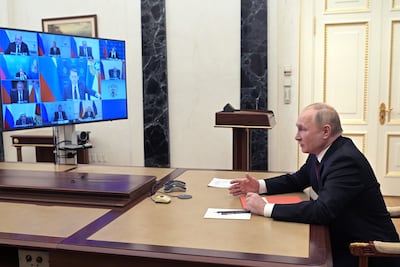Nato raised the alarm on Thursday over Russia’s troop deployment to its ally Belarus, which is adding to the alliance’s concern over Moscow’s intentions in Eastern Europe.
Nato Secretary General Jens Stoltenberg said Russian troop numbers in Belarus, which borders Ukraine to the south, were likely to climb to 30,000.
He said the troops were backed by special forces, fighter jets, Iskander short-range ballistic missiles and S-400 air defence systems.
“This is the biggest Russian deployment there since the Cold War,” Mr Stoltenberg said at Nato headquarters in Brussels.
This included a significant movement of Russian military forces over the past few days, he said at a meeting with the prime minister of North Macedonia.
The movements, which follow the build-up of more than 100,000 troops at Russia’s border with Ukraine, come ahead of expected joint drills with fellow former Soviet republic Belarus.
The Belarusian Defence Ministry told state media that army units and missile defence systems would take part in the combat readiness tests in Belarus.
President Alexander Lukashenko has said that Belarus would fight if it or Russia were attacked but had no interest in a war, while Moscow similarly denies planning an invasion of Ukraine.
Although Nato has no plans to send troops to defend Ukraine, it has moved to bolster the defences of alliance members in Eastern Europe.
Russia, in turn, blamed the deployment of extra US troops in the region for raising tensions.
But in a sign of a possible diplomatic path, it said it welcomed a statement by the US State Department that a set of accords between Russia and Ukraine should be implemented in full.
Moscow and Kiev accuse each other of breaching these accords, known as the Minsk Agreements, which aim to end the long-running war between Ukrainian forces and pro-Russian separatists in the east of the country.
US State Department spokesman Ned Price said Russia was responsible for most breaches of the accords but that they were a “blueprint that would serve to de-escalate tensions” in Eastern Europe.
He said the US supported four-way talks between Russia, Ukraine, France and Germany to help this peace process along.
European diplomats were heartened when this group of four, known as the Normandy format, held talks in Paris last week.

Scholz trip
German Chancellor Olaf Scholz meanwhile revealed that he would follow up those efforts with a visit to the Kremlin in the near future.
Facing his first international crisis, Mr Scholz is under fire for what critics see as a lethargic approach. A leading news broadcast began on Wednesday with the words: “Where is Olaf Scholz?”
He told the programme in response that he would speak to Russian President Vladimir Putin about the “necessary questions” to resolve the crisis.
“The situation is very serious, and you can’t look past the fact that many troops have assembled at the Ukrainian border,” he said. “That is something that could be the precursor to military action.”
French President Emmanuel Macron is considering a separate trip to Moscow after two phone calls to Mr Putin in recent days.
Meanwhile, UK Prime Minister Boris Johnson told the Russian leader on Tuesday that any invasion of Ukraine would be a “tragic miscalculation”.
Diplomatic efforts so far have shown few signs of progress after Russia demanded guarantees that Nato would not expand further eastwards.
Western powers reject this demand, saying it is a sovereign matter for potential candidate countries, such as Ukraine and Georgia.
But leaked documents showed that the US and Nato are willing to negotiate with Russia on other areas, such as military exercises and arms control.












